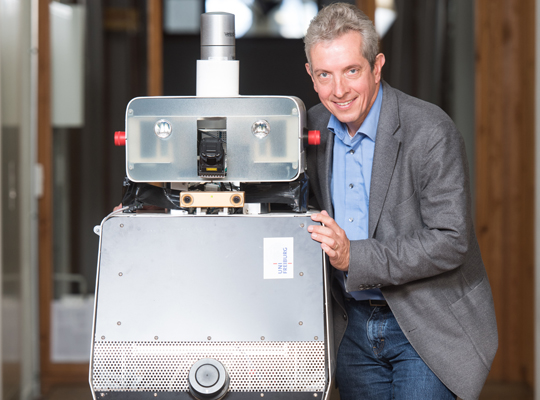At the Top Level
Freiburg, Jun 24, 2019
The world of robotics is meeting in Freiburg: between 22 and 26 June 2019, the Robotics: Science and Systems 2019 international conference is taking place at the University of Freiburg with more than 450 researchers attending from leading sites around the world. The local organizer is IT specialist Prof. Dr. Wolfram Burgard, speaker for the BrainLinks-BrainTools Cluster of Excellence at the University of Freiburg and President of the IEEE robotics and Automation Society, the largest international association for robotics. Nicolas Scherger asked him about the latest trends and developments in his discipline.
 Wolfram Burgard has enabled his robot Obelix to navigate through Freiburg independently – at present the IT specialist is developing autonomous vehicles at the Toyota Research Institute. Photo: Patrick Seeger
Wolfram Burgard has enabled his robot Obelix to navigate through Freiburg independently – at present the IT specialist is developing autonomous vehicles at the Toyota Research Institute. Photo: Patrick Seeger
Mr. Burgard, what are you most looking forward to at the conference?
Wolfram Burgard: We’ve been able to attract some brilliant speakers at the top level who will give us the latest information about the status of robotics. For instance, Prof. Dr. Robin Murphy will report on what robots can do when used for rescue work in a catastrophe, and Prof. Dr. Martin Riedmiller, who works on artificial intelligence at the Google subsidiary Deep Mind, will present new approaches to machine learning.
What are the most promising ideas and trends at the moment in robotics?
One essential aspect is what is called Deep Learning, which is attracting quite a lot of hype. This has achieved a quantum leap in robotics, for example in perception and navigation, which are especially important for driverless cars. Or in manipulation, that is robots’ ability to recognize and reliably hold objects – such as in logistics when they pick specific items off the shelves in a warehouse and pack them for shipping.
Which questions still push research to its limits?
The major challenge is to further increase security and reliability. For instance, staying with the example of logistics: the robot shouldn’t of course send the wrong item in ten per cent of cases. But to achieve a success rate of 99.99 per cent, it must know precisely what items it is dealing with – whether tennis racquets, soft toys or toothpaste. If it has to reliably recognize all these items, it needs massive quantities of data so that it can learn without human assistance. That’s extremely complex.
At the Freiburg Institute for Advanced Studies (FRIAS) you are involved in the ‘Responsible Artificial Intelligence’ research focus. Why is the social dimension so important?
This theme is present everywhere, because in the end there is always the question about control and responsibility. For instance, you have to be extremely careful and watch what you are doing when you allow autonomous vehicles on public roads. As researchers we must bring such artificially intelligent systems into society safely. Within the framework of the conference we are organizing a ‘Saturday-Uni’ where members of the FRIAS research focus will discuss this with anyone who is interested.
When you talk to others about what will be possible in future – do you mostly encounter enthusiasm or do there tend to be reservations?
Both. Someone who is tech-savvy may tend to be happy if one day a robot will clean the kitchen for them. Others are more inclined to fear that jobs will be lost and the world will as a whole become colder because we will be dealing more with machines than with people. My impression is that in the USA or Japan robots are more generally seen as a help to people, and they are on the whole more positive about the issue than in Europe.
You are currently the Vice President for Automated Driving Technology at the Toyota Research Institute in Los Altos, USA. What scientific project are you involved in there?
I work on autonomous vehicles; Toyota is unique here in not just looking at cars autonomously driving from A to B, but also at assistance systems that help drivers in extreme situations. They intervene for example when the car starts to skid on black ice or when there is about to be a crash because the driver hasn’t noticed an object and therefore isn’t responding.
How do you manage to combine this with your professorship in Freiburg?
That’s a question of management structures, which are very good both at the Cluster of Excellence and at Toyota, and give me great support. We have a lot of telephone conferences despite the time difference of nine hours. So sometimes I have to get up a little earlier to get through the work for the day. It is considerably more work, but I also find it stimulating – especially with the FRIAS research focus, which gives me a lot of new input.
Which application of artificial intelligence will change our everyday lives most in the coming years?
People will interact with machines far more through cameras and speech. It’s extremely important that we in Germany push ahead in automating production, because other nations aren’t hanging about. Furthermore we will perhaps see cities where there are far fewer parked cars than today, because the entire transport will be intelligently organized. In addition to this there are sectors such as agriculture where we will have to increase yield through automation to feed the growing global population.
Which of your work group’s projects in Freiburg do you believe has special potential?
Together with the Karlsruhe Institute of Technology we have a lovely project on human/robot interaction. The goal is through language and gestures to teach the robot to undertake specific tasks. I’m expecting cool results from this.
More information
Robotics: Science and Systems 2019
‘Responsible Artificial Intelligence’ themed days at the University of Freiburg

